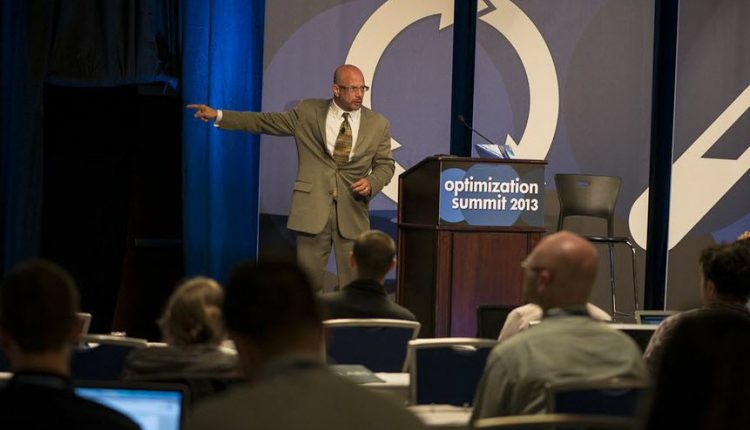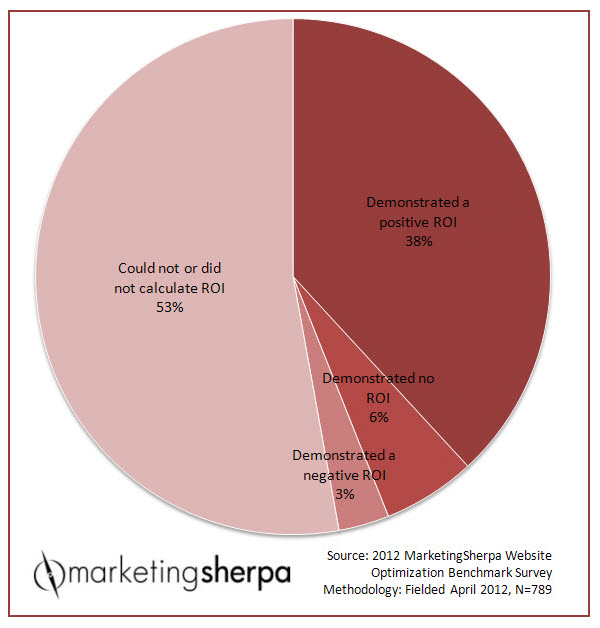Three-piece suits. A smoky conference room. Wood paneling. And then, Don Draper drops one of these on the brand-side marketers in the room …
“This device isn’t a spaceship, it’s a time machine. It goes backwards, and forwards … it takes us to a place where we ache to go again. It’s not called the wheel, it’s called the carousel. It lets us travel the way a child travels – around and around, and back home again, to a place where we know are loved.”
As we gather in Boston for MarketingSherpa and MarketingExperiments Optimization Summit 2013 over the next few days, I realize how much marketing has changed since the 1960s.
People haven’t changed. Human nature hasn’t changed. We probably choose to buy or not buy T-shirts from Patagonia for the same reasons our ancestors chose to buy or not buy togas from Parthenon Pete’s Emporium.
But you, the marketer, has changed
The marketers I’ll learn from over these few days here at Optimization Summit aren’t Mad Men — they’re Smart Men and Women.
While ideas are still as important as ever (and don’t get me wrong, I love a good concepting session more than anyone), data has become pervasive. And with it, there is the opportunity for more informed (and better tracked) ideas.
It really struck home for me on a recent trip to Kennedy Space Center. The Apollo computers, which helped put man on the moon, had less computer power than the phone in your pocket. Heck, they had vastly less computing power than a desktop PC … from the ‘80s.
The rise of the evidence-based marketer
Easily available computing power allows marketers to learn unprecedented insights. So, they can achieve a better understanding of their customers to inform their concepting.
Even better, they can see if that clever “carousel” concept that sounds so good in the conference room really resonates with customers. [Spoiler alert: In working with many of the presenters on their Optimization Summit case studies, it’s always refreshing to see how often A/B testing surprised experienced marketers. “We thought they were interested in luxury, but they were really interested in trust.” On the flip side, “We thought they were interested in convenience, but what customers really wanted was luxury.”]
Beyond seeing what really works, this computing power (when combined with optimization and testing) gives marketers the ability to prove it works. And, it has an impact where it really matters … on the bottom line.
So, I was pretty surprised that when we asked marketers about return on investment (ROI) in the MarketingSherpa 2012 Website Optimization Benchmark Report, they told us this …
Q: Did optimization or testing demonstrate ROI in 2011?
Simply put, the majority of marketers are taking the time, effort and resources to invest in optimization, but they don’t know if it’s worthwhile.
38% of marketers said optimization and testing demonstrated a positive ROI
Now, in fairness to those marketers who don’t know the ROI, it can be difficult to track. How much IT time was involved? How much was our agency involved? Is that time we spent discussing a headline part of an optimization effort, or just everyday marketing?
And, of those who do track ROI, an overwhelming number found a positive ROI, so many marketers might safely assume (even if they can’t prove) that it’s worth the effort.
But if you’re tracking analytics, customer intent, transactional data and test results with this fancy new computing power, perhaps it’s at least worthwhile to dip a toe into some ROI measurement, like Andrew …
“We just started tracking our website optimization ROI in 2012, albeit via fairly non-scientific methods. We focused on traffic, since that’s the main KPI for our small business,” said Andrew Schrage, Editor-in-Chief, Money Crashers.
“Since doing so, we’ve seen a positive tracking throughout,” Andrew said. “We are looking at a more scientific approach to tracking ROI, but for the moment, we’ve been pleased with our efforts. We also now understand that it’s essential to track website optimization ROI to determine if marketing dollars and time are being well-spent.”
Over the next few days at Optimization Summit, we’ll be discussing many powerful case studies that show just how profitable optimization can be. But, it never hurts to know for yourself. After all, even Don Draper is wrong every now and then.
Related Resources:
Marketing Optimization: The 3 phases of evidence-based marketing
5 Things You Need to Start a Small Business (via Money Crashers)





Optimization without tracking results is not to far off from shooting in the dark while blindfolded. In our company, we’ve begun tracking the time we spend on various aspects of projects (both for clients and for internal work) so we can better gauge costs and become more effective and efficient in our efforts. Excited to hear more about what you find out at the summit!
At our company we’ve been tracking results in ROI since the beginning as well. I will be checking back soon to read what you’ve learned at Optimization Summit!